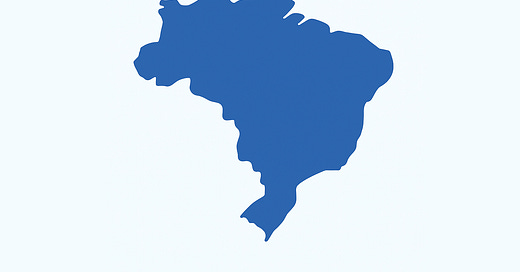Brazil’s AI Crossroads: Regulation in the Spotlight
Lawmakers are looking to balance the need for risk management and guardrails with creating opportunities for innovation and entrepreneurship
Latin America’s biggest economy is by some measures one of the world’s fastest adopters of artificial intelligence, making it a promising proving ground for AI deployment – and a test case for AI regulation.
Brazil is a regional leader. In 2024, organizational adoption of AI stood at 86%, while 85% of workers reported using it in their workplace, according to a KPMG–University of Melbourne study. Those figures are not as high as those of China but well ahead of the United States, the United Kingdom, and Japan.
How can Brazil reap the benefits of LLM technology while keeping the chatbots from prescribing the wrong medications or arbitrarily wrecking credit scores? How can the country teach the bots about Brazilian culture while making sure the machines don’t turn Jorge Ben’s songs into low-grade funk radio hits? Or use Clarice Lispector’s literature to write pulp romance?
The debate about how to regulate the development and deployment of artificial intelligence is spurring tension between those focused on risk mitigation and minimizing potential damage caused by AI and those seeking to ensure opportunities for Brazilian AI innovation.
AI Bill
Brazil’s Senate in December approved PL 2338/2023, which seeks to build human-centered AI oversight with explicit provisions for protection of human rights, accountability for harm, and non-discrimination.
It classifies AI systems into different risk categories ranging from low (spam filters), medium (customer service bots), high (AI products involved in health, education, credit scores or hiring), to unacceptable risk (state-backed social scoring systems).
It forbids the use of copyrighted material without the owner’s permission, gives authors and artists the right to remuneration if their work is used in commercial AI systems, and establishes accountability when AI causes harm.
The risk-based approach is similar to the European Union Artificial Intelligence Act. The US framework in contrast is built on a patchwork of executive orders and state regulations with no federal law, and relies heavily on industry standards and voluntary protocols.
Guardrails and Stability
An excellent article in Estadão, part of a series by tech reporter Rique Sampaio, lays out the debate over how to strike this balance with a clear explanation of the global context.
Fábio Cozman, director of the Center for Artificial Intelligence at the University of São Paulo, says the legislation gets the pace right. Regulations that allow for rapid changes might work in Switzerland or Germany but in Brazil would create unfair competition for small- and medium-sized businesses.
Dora Kaufman, a professor at Pontifical Catholic University of São Paulo who researches the social impacts of artificial intelligence, says the legislation will create incentives for investment by creating regulatory stability.
(Read Rique Sampaio’s deep dive about the debate over intellectual property rights, or look through the whole series called Technology In Transformation.)
‘National Tragedy’
Anderson Soares of the Center of Excellence for Artificial Intelligence at the Federal University of Goiás described the legislation as a “national tragedy” that will limit Brazil’s capacity to innovate in artificial intelligence and leave it more dependent on foreign technology.
Separately, Henrique Zétola of think tank Sivis in a column says that government efforts to facilitate the removal of AI-generated content deemed “illicit” will effectively chill free online expression in the name of regulating AI.
Big Tech in the Mix?
Big Tech may already have influenced the direction of the bill, according to a Rest of World story in January. The story points out that the bill was watered down after Senator Marcos Pontes met in Washington with Big Tech leaders and later decided he supported a less restrictive version of the law.
Copyright Stops at the Border
Brazil’s effort to protect intellectual property from AI training echoes a broader global conundrum facing authors, artists and content creators: strict laws in one country preventing machine training on copyrighted material can easily push AI training to countries with no such restrictions.
Models trained in the United States on the music of acclaimed Brazilian musician Gilberto Gil or the literature of Mozambican writer Mia Couto could be released back into Brazil even though the law prohibits precisely this.
In response to British artists’ request for strict copyright protections, some policy skeptics noted that overly stringent rules would ultimately push AI innovation elsewhere while still doing little to protect intellectual property.
A New Deal for Creators?
Ideas for shifting the power balance include:
Deploying digital watermarks that would provide artists with evidence that their work has been used in LLM training.
Reversing the burden of proof such that AI developers, in the face of suspicion that they’ve trained models on copyrighted work, would need to demonstrate that they have not.
Requiring accountability by LLM developers to explain the provenance of their data, preserve datasets, and be held accountable for their use in machine learning.
The Senate-approved bill establishes accountability and auditability as general principles of AI development in Brazil, which could make AI trainers more cautious about which data they use and give regulators some enforcement power.
Refazendo Tudo - Remaking Everything
Gilberto Gil and Mia Couto, it turns out, have differing perspectives on the relationship between the arts and AI as evidenced by their chat at Festival Fronteiras, an annual film festival held in Goiás.
Couto lamented that AI is owned by people whose goals “are profit, competition, and something that can dehumanize us.”
But it was Gil’s take that generated headlines. “Languages, thoughts, sayings, things, all of this fuels artificial intelligence. It is my obligation to contribute to it,” he said.
LOL Prompt
Brazilian Genesis Influencers
“My videos are bit delayed because 5G was terrible at sea,” a Brazilian Noah apologizes to fans in a POV post after months onboard the ark.
“Hey everyone, with this video my channel is finally going to make money,” celebrates Jonah while filming himself inside the belly of a whale.
“Hashtag #freemypeople,” shouts Moses to the Egyptian pharaoh.
It’s called VLOG Bíblico and it turns biblical characters into AI-generated Brazilian influencers. It’s hilarious.





